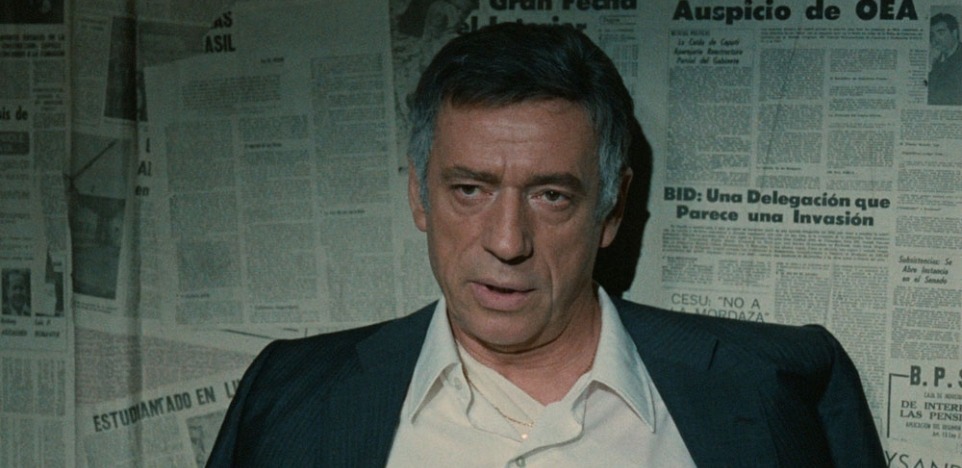Director Costa-Gavras has created a vivid and relentless political film that is both a well-made cinematic experience and a thrilling historical document. The brilliant director of Z (an expose of the concealment of a political crime by Greece's dictatorship) and The Confession (a condemnation of Stalinism in Czechoslovakia) has turned his attention to the events surrounding the political assassination of an American communications specialist with the Agency for International Development (AID) stationed in Latin America. Music by Mikis Theodorakis and cinematography by Pierre William Glenn have an urgency and forward thrust to them that give State of Siege a uniquely demonstrative impact.
We are immediately propelled into an tense Latin American city. Police barricades have been set up on every street and highway. People and vehicles are being searched. The body of Philip Michael Santore (Yves Montand) has been discovered in a stolen car. Parliament decides to set aside a national day of mourning. At the funeral, a TV announcer states: "It is regrettable that the places reserved for the university president and faculty are empty." Who was Santore and what was he really doing in Latin America? Flashback to his kidnapping.
Santore is picked up by young members of Tupamaros, a guerilla group who steal cars for their own use. He is wounded in the capture; a Brazilian counsel taken with him is unharmed. As Santore is questioned by the guerillas, we realize that this American AID official's title "communications expert" is really a cover for his other activities. His specialty is "anti-guerilla warfare" — the torture and elimination of the left-wing revolutionary opposition. An interrogator states: "You're a man who directs. You directed the Belo Horizonte police in Brazil, the Santo Domingo police and our own...You say you are defending freedom and democracy. Your methods are war, fascism and torture." Santore remains cool until he realizes that the group knows everything about him. He then reveals his true feelings: "You are subversives, communists. You want to destroy the foundations of society, the fundamental values of our Christian civilization, the very existence of the free world . . . You are an enemy who must be fought in every possible way." This encounter between men of totally divergent political philosophies is utterly terrifying.
Costa-Gavras keeps the ideological hot line of this complex film taut and tense. We see the Parliament divided in responses to the kidnapping. The government does somersaults trying to make a politically safe reaction to the rebel demands for release of political prisoners. Journalists frantically struggle to get beneath the official rhetoric surrounding Santore's capture. The mechanics of inquiry on all these different levels raises the drama to a high pitch.
Costa-Gavras and sceenplay writer Franco Solinas present us with the dehumanized process whereby the Tupamaros rationalize execution in the name of liberation and the police justify torture and murder in the name of civilization. The world is a much worse place as a result of these violent parties. Until human life becomes more important than political slogans, liberation and order will remain two of the most blood-stained words in any language.
As a footnote, ponder the following statement made by a journalist to an American official: "Be it drinking beer, swallowing aspirin, brushing his teeth, cooking his food in an aluminum pan, turning on a radio, shaving, using his refrigerator, or heating a room, every citizen in my country contributes daily to the development of your economy."
